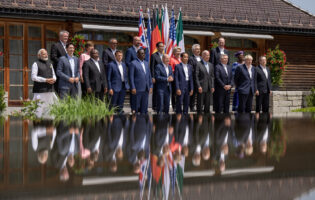A Model System Versus a Mediocre System?
On October 8, 2009, the American-German Institute (AGI) held a workshop in Washington, DC, on “A Model System Versus a Mediocre System? A Comparison of Muslim Immigration and Integration in the U.S. and Germany,” which was made possible through the generous support of the Robert Bosch Foundation. The event was part of a larger project on Muslim integration and builds on AGI’s previous work on religion and politics. The three panels brought together an interdisciplinary group of scholars and experts from Germany, Europe, and the United States to examine the socio-economic facets of Muslim integration, domestic integration policies, and the influence Muslim integration has on the foreign policies of Germany and the U.S.
The first panel began by focusing on the socio-economic factors associated with immigration as a whole and later delved into specific challenges faced by Muslim immigrants in America and Germany. For instance, one scholar pointed out that, in the United States, 7 in 10 immigrants feel the U.S. to be their permanent home despite the fact that almost 6 in 10 say they face discrimination on a daily or weekly basis. It was also noted that since 2002, those polled as being “extremely satisfied” with their current status dropped from 55 to 34 percent. This is in contrast to the figure for Muslims in the U.S., of which almost 61 percent feel their lives vastly improved as a result of their move. Muslims in the U.S. are predominately from south and southeast Asia, with only 35 percent originating from the Middle East and North Africa (MENA) region. One panelist stated that America is unique in that unlike Europe, Muslims come from various parts of the world and are dispersed throughout the entire country. It was agreed that while Muslims are creating a unique cultural sphere in the West, they are more likely to interact with non-Muslims in America which, in turn, creates a window of opportunity as they acquire the language skills necessary for personal growth and development. While they tend to be far more educated than other immigrants (77 percent have completed high school) they are behind in terms of setting up a religious and social network, which only began in 1994.
Unlike the United States, Muslims in Germany are only starting to “root” themselves within their destination country. While they originate mainly from Turkey, the country is starting to see an increasing presence of Muslims from southeast Europe and the Middle East. One panelist stated that almost 42 percent of Muslims immigrate to Germany in order to reunite with their families. It was also noted that the percentage of those coming for work and seeking asylum is the same, at almost 21 percent. Some argued that educational performance of Muslims in Germany is dangerously low and many suffer from high dropout rates due to difficulties with the language. The low degree of “social linguistic integration” combined with already established barriers to growth, such as discrimination and insecure visa status, has limited the upward mobility of Muslims. One speaker focused specifically on the large Turkish population and argued that restricted economic opportunities are a direct result of the absence of opportunity for German citizenship. The reasoning is that Muslims without citizenship are pushed out of the political system and are forced to create close ethnic associations and neighborhoods, which in turn isolates them from the rest of the community. Also, the fact that Islam is not a recognized religion within the country prevents organizations from creating Islamic schools, which are vital tools when trying to curb the 25 percent dropout rate among Muslim youths. There is also a fear that increased marginalization of Muslims may lead to growing religiosity and less integration.
The second panel highlighted the domestic integration policies pursued by both the United States and Germany with respect to their Muslim immigrant communities. Since September 11, the politics of anti-terrorism has served as an impediment to integration of Muslims. One panelist argued that it is far easier for first generation Muslim immigrants to integrate into society as they harbor only modest expectations upon arrival whereas second or third generations set their goals and priorities much higher. Some policies that have circulated among government officials, such as mastering the English language within a year or supporting measures for rapid assimilation, are often counterproductive to integration. There is a disincentive to become a Muslim civil activist in the United States because, more often than not, one will be targeted with having connections to terrorist activities.
Another scholar argued that there is a difference between the “official” and “actual” rhetoric on Muslim integration in America. While the government claims Muslims have been successfully integrated into society, they are often criticized in the media, most notably during the 2008 presidential campaign when Barack Obama was targeted as a Muslim. In addition, American counterterrorism policies have had a profound and lasting impact on the Islamic community. For instance, the unconstitutional interrogations of Muslims traveling home to the United States and the act of racial profiling are believed to fuel radicalization within this community, not reduce it.
In Germany, domestic integration policies have started off slow as the federal government has only just started speaking directly and indirectly with the Muslim community. While the government has produced “confidence building measures” to integrate Muslims into German society, a so-called “Muslim Test” intended to measure whether someone has fundamentalist tendencies has been criticized as singling out Muslims based on their religion. The panelists agreed that there is an abstract fear of Islam within Germany despite the fact that the Constitution states religion can produce stability and morals within a society. Almost 80 percent of Germans believe Islam to be “backward” and violent, which has prevented the federal government from recognizing Islam as a religion. One expert stated that current German political discourse does not allow for the separation of migration and religious issues. The inability of the government to define being Muslim as either a race or religious affiliation has stalled integration efforts on the ground.
The afternoon panel discussed the impact of Muslim immigrants on foreign policy. The panelists shared the opinion that foreign factors cannot be separated from domestic ones. In this respect the speakers agreed that 9/11 was a turning point and has had several impacts on the issue of Muslim immigrants and on foreign and domestic policies in both the U.S. and Germany. With regard to the U.S., it was highlighted that on the one hand, a vast majority of Muslim Americans did not approve of the use of war as a tool of foreign policy and had a negative opinion about the effectiveness of the so-called war on terror. Therefore, few Muslim Americans agreed with Bush’s political performance at all. On the other hand, it was also pointed out that since 9/11, Muslim organizations in the U.S., such as the American Muslim Council or the Islamic Society of North America, have become more involved in politics. Moreover, faith-based or religious groups have also entered the political discussion. This is partly a result of the new challenges Muslim Americans have been facing since 9/11. In particular, it was argued that Muslims in the U.S. feel the pressure to educate people about Islam and at the same time to educate Muslim people about the U.S. Against this background it was pointed out that it is more than necessary to strengthen the intercultural dialogue in order to improve relations between Muslims and non-Muslims in the U.S. With regard to the political involvement of Muslim citizens, however, the problem of a lag of voter registration among American Muslims was expounded. In contrast to non-Muslim Americans, Muslim citizens are less likely to be registered to vote, whereas native-born Muslims generally vote more than their foreign-born counterparts.
From a German perspective, the impact of Muslims on foreign policy in Germany seems to be rather limited since foreign policy generally is – as it was argued – more an “elite” affair. Moreover, it was also stressed that foreign policy has a greater impact on domestic issues than German Muslims have on foreign policy. A changing political climate since 9/11 toward Muslims in Germany has, for example, resulted in increased suspicion toward them. Another aspect that was mentioned to underline the low impact of Muslims on foreign policy in Germany was that it is difficult to unite Muslims under the banner of Islam. Muslims in Germany have many different origins and therefore different identities, which are linked to different political interests that are difficult to bundle. In contrast to these observations it was stated that, although there might not be large pressure groups, Muslims in Germany do have a high interest in foreign affairs. In this context it was argued that individuals’ perceptions of foreign policy issues have become more globally-minded these days, due to advancing technological developments connecting and informing people worldwide. This global-mindedness also raises higher expectations among Muslims toward foreign policy makers in Germany.







